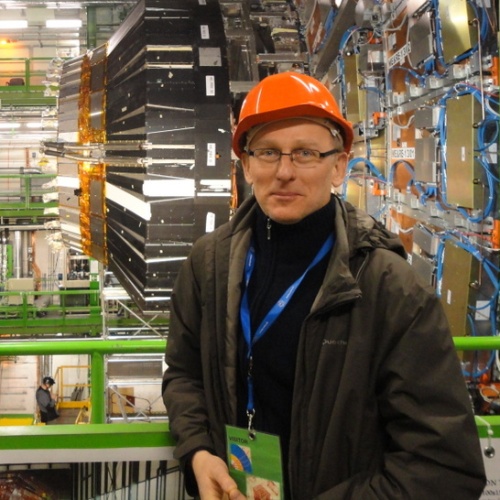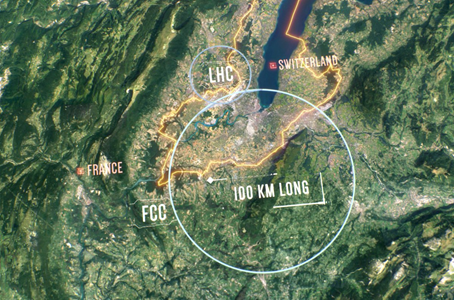CERN | My story
photo from the private archive
Prof. JANUSZ GLUZA
Cooperating with outstanding, world-class theoreticians and experimenters, I have an irresistible feeling of participating in complex, timeless projects, contributing to the fact that the University of Silesia is recognized as a scientific centre in the country and in the world, and this brings considerable satisfaction to us all.
|
CERN | MY STORY
|
Despite the rapid development of technology and science, in physics, there remain many fundamental questions about the nature of the Universe to which we do not know the answer, for example, what is the so-called dark matter, what is caused by the asymmetry between matter and antimatter? Answers to these and many other questions occupying the minds of physicists around the world may be provided by the planned successor to the LHC – Large Hadron Collider, FCC (Future Circular Collider). A circular collider, the construction of which is being considered at CERN, would be 100 km long. Using the best available technology will allow obtaining even 100 times more precise measurements than the current ones. However, the experiment alone is not enough. In modern physics, to make a discovery, the cooperation of theory and experiment is needed. Without theoretical predictions, we would not be able to interpret the results of the experiment well, and thus the whole project with a total cost of several billion euros would simply be useless. On the theoretical side, it is necessary to obtain higher precision of calculations. Below is an illustration of the planned FCC collider, highlighting the currently operating 27 km diameter LHC. The geographic location of the LHC and FCC accelerators. Private observations | Note about the team My cooperation with CERN began in 2013, when Prof. Stanislaw Jadach from Institute of Nuclear Physics of the Polish Academy of Sciences in Kraków, Poland, called me with the information that a new project on future accelerators (it was about FCC) at CERN is being created, and that my work as a theoretician would be very helpful. Previously, I worked mainly with the German research center DESY. Incidentally, I started more or less at the same time (2012) together with Tord Riemann, PhD (DESY) and his PhD student Johann Usovitsch, Prof. Ayres Freitas (University of Pittsburgh, USA) and Ievgen Dubovyk, PhD (he was a guest in Katowice for a year as a part of EU LHCPhenoNet network) work on completing the theoretical calculations within Standard Model for Z boson decay, in the second order of perturbation calculus. We optimistically hoped that the method we developed (computing Feynman integrals in the Mellin-Barnes representation) could be quickly applied to these calculations; in fact, we did not finish the work until six years later, in 2018. Unfortunately, serious projects going beyond the current state of knowledge are necessarily very time-consuming. On the whole, however, it is worth taking the risk of such work, the fruit of which are important publications that enter the canon of literature in a given field. Currently, the team consists of a group of talented, dedicated scientists, Assistant Professors: Bartosz Dziewit, PhD and Ievgen Dubovyk, PhD, PhD students: Wojciech Flieger and Krzysztof Grzanka, Magdalena Kordiaczyńska, and students Karolina Skrzydelska and Szymon Zięba. We cooperate with scientists from the USA, Germany, and India. We carry out scientific tasks, among others, as part of NCN research projects, the subject matter of which is closely related to CERN:
Our current priority is to perform further theoretical calculations fully confronting the theory with experimental data, which in the FCC accelerator will be in many cases 100 times more precise than the data available so far. These calculations will undoubtedly take another few years, but we already know that the calculation methods used so far are not sufficient, and we are developing another approach, in which the so-called Feynman integrals are calculated using … a system of differential equations. As Isaac Newton put it in a 1675 letter regarding his discoveries: “If I have seen further, it is by standing on the shoulders of giants.” Building on the knowledge created over generations, using the achievements of eminent scientists leads to creativity, innovation, and development. Cooperating with outstanding, world-class theoreticians and experimenters, I have an irresistible feeling of participating in complex, timeless projects, contributing to the fact that the University of Silesia is recognized as a scientific centre in the country and in the world, and this brings considerable satisfaction to us all. At the August Chełkowski Institute of Physics, we try to involve students and doctoral students in important scientific research carried out as part of international cooperation. In this way, we try to discover together the secrets of the Universe and outline new development directions. Working with young, ambitious scientists makes us plan new projects with passion and unwavering commitment, hoping to contribute to spectacular discoveries in the microworld and high-energy physics. |
|







